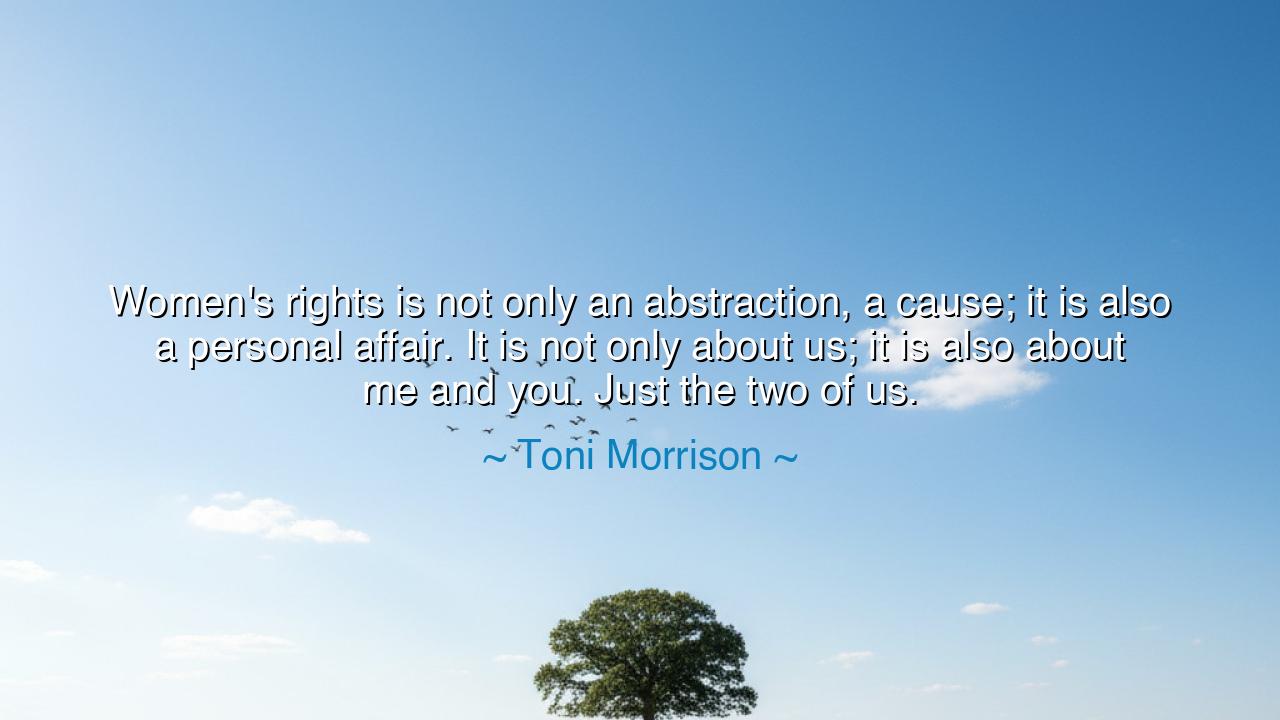
Women's rights is not only an abstraction, a cause; it is also a
Women's rights is not only an abstraction, a cause; it is also a personal affair. It is not only about us; it is also about me and you. Just the two of us.






When Toni Morrison declared, “Women’s rights is not only an abstraction, a cause; it is also a personal affair. It is not only about us; it is also about me and you. Just the two of us,” she wove together the voice of the collective and the whisper of the individual. In these words, she reminds us that the struggle for women’s rights is not some distant thunder of movements and speeches, but a fire that burns in the smallest of human exchanges — in the gaze between two people, in the fairness of a home, in the way one soul honors another. For Morrison, justice was never a banner to be waved alone in public squares; it was a rhythm that must echo in the private chambers of the heart.
In the style of the ancients, one might say: the goddess of justice does not descend upon crowds first — she enters through the door of the soul. Equality is not born from grand declarations, but from quiet recognitions — when one person looks upon another and says, “You are not lesser than I.” Thus Morrison speaks to both the universal and the intimate. The cause of women’s rights may move nations, but it must also move dinner tables, friendships, and families. The true revolution begins not only in parliaments, but in the space between “me and you.”
Throughout history, the greatest movements have always begun with this personal awakening. When Sojourner Truth stood before the crowd in 1851 and cried, “Ain’t I a woman?” she was not reciting policy — she was speaking from the core of her being, turning her pain into truth. Her voice shook the walls of prejudice not because it was loud, but because it was deeply personal. Morrison’s words carry that same lineage: the call to remember that every act of justice must pass through the gateway of relationship. Until equality is lived between two people, it cannot truly be said to live among the masses.
Toni Morrison, as a writer and teacher, understood that language builds the soul of a people. In her novels, she did not merely speak of women’s oppression — she revealed the interior world of Black womanhood, showing how love, freedom, and dignity could coexist even amid pain. Her quote reflects this same principle: that the political is born from the personal. To fight for women’s rights is not to fight only for laws, but to fight for the daily respect that gives those laws meaning. It is to demand not just justice on paper, but honor in the heart.
Consider the relationship between John Stuart Mill and Harriet Taylor, two thinkers of the nineteenth century whose shared intellect gave rise to one of the earliest arguments for women’s equality. Their bond was both personal and revolutionary. Mill wrote The Subjection of Women not as a detached philosopher, but as a man transformed by love — by seeing his equal in a woman who refused to be silenced. In that partnership, the personal and the political became one, proving Morrison’s truth: that the battle for women’s rights is not about crowds against systems alone, but about one mind meeting another in dignity.
The lesson Morrison offers is as timeless as it is urgent: no law, no movement, no manifesto will ever bring equality if hearts remain unchanged. The cause must be lived, not just proclaimed. Each person must look inward and ask, “Do I honor the women around me — in speech, in gesture, in listening, in respect?” For the revolution of equality is fought not only in courts, but in kitchens, classrooms, and conversations. It is in how we raise our sons and how we believe our daughters.
So let this teaching endure: women’s rights is not a distant dream for others to achieve — it is a mirror held before each of us. In the stillness of that reflection lies the beginning of justice. If every heart practiced fairness, if every relationship breathed respect, then equality would no longer need to be demanded — it would simply exist, as natural as air.
And when Morrison says, “Just the two of us,” she is calling us to sacred action — to begin where all true change begins: between one soul and another. For if even two people can learn to live in respect, the world itself begins to shift. And from that seed of understanding, nations may yet be healed, and humanity may yet rise to its highest truth — that in love and in justice, there are no lesser beings, only shared light.






AAdministratorAdministrator
Welcome, honored guests. Please leave a comment, we will respond soon